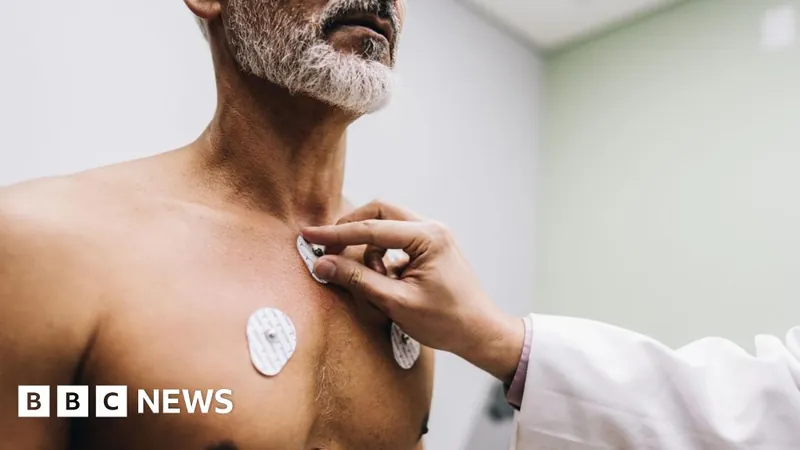
Breakthrough AI Technology Could Revolutionize Early Detection of Type 2 Diabetes
2024-12-24
Author: Arjun
Groundbreaking Initiative in Diabetes Detection
In a groundbreaking initiative, two NHS hospital trusts in London are pioneering the use of artificial intelligence (AI) to assess the risk of developing type 2 diabetes in patients as much as ten years before the disease manifests. This could be a game-changer in the fight against a condition that affects millions.
Development of Aire-DM AI System
The Imperial College and Chelsea and Westminster Hospital NHS Foundation Trusts have joined forces to develop an advanced AI system known as Aire-DM. This innovative technology analyzes patients' ECG (electrocardiogram) heart traces, searching for subtle early warning signs that are often overlooked by even the most experienced medical professionals.
Promising Initial Findings
Initial findings are promising—Aire-DM has demonstrated the ability to identify potential diabetes risk approximately 70% of the time. Lead researcher, Dr. Fu Siong Ng, underscores the importance of combining ECG insights with additional patient data, such as age, gender, and pre-existing conditions like high blood pressure or obesity, to enhance predictive accuracy. He stated, "It is already quite good just with the ECG data, but it is even better when you add in those."
Complex ECG Analysis
Dr. Ng further explained that the ECG changes detected are too intricate for the human eye to discern. "It's not just about picking out individual components; it requires analyzing complex interrelations within the data," he noted.
Upcoming Clinical Trials
As part of the upcoming clinical trials, which are set to commence in 2025, up to 1,000 patients at both hospitals will undergo ECG scans to evaluate the AI's efficacy in diagnosing diabetes risks. Despite not being available to the public just yet, experts hope this technology will have broader applications within the NHS in the coming years, potentially revolutionizing how diabetes risk is evaluated and managed.
Significance of Research
Supported by the British Heart Foundation, this research is especially significant due to the correlation between uncontrolled type 2 diabetes and severe health complications, such as heart attacks and strokes. The Foundation emphasizes that proactive diabetes detection can vastly improve patient outcomes.
Expert Insights on AI in Health
According to Professor Bryan Williams, Chief Scientific and Medical Officer at the British Heart Foundation, “This cutting-edge research exemplifies how AI can unearth patterns in health data that are rarely visible without advanced technology. This technological progress could significantly alter how we forecast the onset of type 2 diabetes, allowing for intervention long before serious health issues arise.”
Urgent Need for Risk Identification
Dr. Faye Riley from Diabetes UK echoed this sentiment, highlighting the urgent need to identify individuals at risk of type 2 diabetes, given that over 1.2 million people in England are currently unaware they have the condition. “AI-assisted screening represents a hopeful innovation in preemptively identifying those at risk, ensuring they receive essential interventions to avert life-altering complications like heart failure and vision impairment,” she remarked.
Understanding Type 2 Diabetes
To understand type 2 diabetes, it is important to know that it occurs when blood sugar (glucose) levels become excessively high. This happens when the body either produces an insufficient amount of insulin or cannot utilize it effectively. Excess weight is a major contributing factor, as accumulated fat can interfere with insulin production.
The Future of Diabetes Prevention
As the healthcare landscape continues to evolve, advancements like Aire-DM could provide a vital tool in combatting the alarming rise of type 2 diabetes, allowing individuals to proactively manage their health and improve their quality of life. The future of diabetes prevention may indeed lie in the hands of artificial intelligence.




 Brasil (PT)
Brasil (PT)
 Canada (EN)
Canada (EN)
 Chile (ES)
Chile (ES)
 España (ES)
España (ES)
 France (FR)
France (FR)
 Hong Kong (EN)
Hong Kong (EN)
 Italia (IT)
Italia (IT)
 日本 (JA)
日本 (JA)
 Magyarország (HU)
Magyarország (HU)
 Norge (NO)
Norge (NO)
 Polska (PL)
Polska (PL)
 Schweiz (DE)
Schweiz (DE)
 Singapore (EN)
Singapore (EN)
 Sverige (SV)
Sverige (SV)
 Suomi (FI)
Suomi (FI)
 Türkiye (TR)
Türkiye (TR)